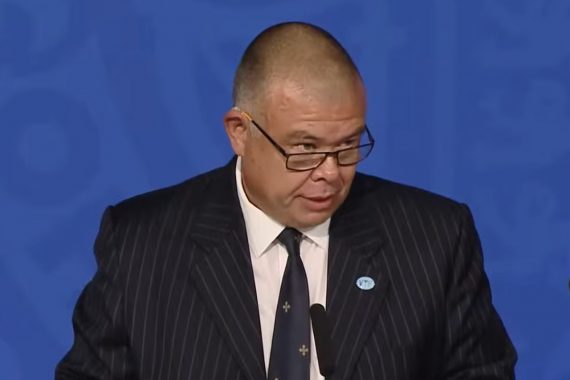Covid booster jab eligibility to be expanded to all over-18s

The JCVI has recommended that the Covid booster jab campaign should be expanded to all over-18s in response to the Omicron variant.
It also recommended that a booster dose can be given three months after completion of the initial course of vaccination – a reduction from previous guidance of six months.
Further, 12 to 15-year-olds should have their second dose of Covid vaccine 12 weeks after their first dose, the JCVI added.
And patients who are immunosuppressed should be offered a booster dose, three months after their third jab, which had completed their initial vaccination course.
The JCVI said that the intention of the measures is ‘to accelerate the deployment of Covid-19 vaccines before the peak of any impending Omicron wave’.
But they added that this comes as there ‘is currently no data to indicate that Omicron infection is associated with a change in the pattern of susceptibility to serious Covid-19 (hospitalisation and death)’.
Boosters should continue to be prioritised for persons of older age, or who are in Covid-19 at-risk groups, as these ‘are likely to remain at higher risk from serious Covid-19’.
Pfizer and Moderna vaccines continue to be recommended for the booster dose, although anyone unable to have the mRNA vaccines can have an AstraZeneca jab instead.
Speaking this afternoon in the House of Commons, health secretary Sajid Javid said: ‘I have accepted this advice in full. With this new variant on the offensive, these measures will protect more people more quickly and make us better protected as a nation.’
The announcement comes just weeks after the booster campaign was expanded to include over-40s, in addition to vulnerable and older adults.
Speaking at a news briefing about the new measures, deputy chief medical officer Professor Jonathan Van-Tam said that ‘the NHS is now working through the updated guidance, and it’s going to set out in the next few days how that is going to be operationalised’.
He added that he ‘would say it is undoubtedly at a very complex phase in the NHS vaccination programme’ because it is still supplying first, second, third and booster doses.
‘I think the important message that the NHS wanted me to convey to you today is that they understand the real urgency of this,’ Professor Van-Tam said.
Professor Van-Tam also admitted that the boosters were likely to be less effective against the heavily mutated Omicron strain, although he likened it to a football team with ten rather than 11 players.
In Parliament, Mr Javid also added: ‘It represents a huge step up for our vaccination programme, almost doubling the number of people who will be able to get a booster dose to protect themselves and their loved ones.
‘And I know that we are asking more from NHS colleagues who’ve already given us so much throughout this crisis, but I know that they will be up to the task.’
He said he would share further information about how the new advice would be put into practice ‘in the coming days’.
Regarding the reduction from six to three months before booster jabs, the JCVI explained that it wants to ensure that boosters have been rolled out when a potential wave of Omicron cases hit the UK.
JCVI Covid-19 chair Professor Wei Shen Lim said that ‘where is is possible it is usually advisable and beneficial to extend the duration between two vaccine doses’ but that ‘on the balance of that’, ‘we don’t want to wait so long that a wave is upon us and we haven’t delivered the booster dose’.
‘We can give a booster dose at three months and expect a good response based on trial data.’
New JCVI advice in full
JCVI advises the following immediate measures within the COVID-19 vaccine programmes:
-
Booster vaccination eligibility should be expanded to include all adults aged 18 years to 39 years.
-
Booster vaccination should now be offered in order of descending age groups, with priority given to the vaccination of older adults and those in a COVID-19 at-risk group. Booster vaccination should not be given within 3 months of completion of the primary course.
-
Severely immunosuppressed individuals who have completed their primary course (3 doses) should be offered a booster dose with a minimum of 3 months between the third primary and booster dose. Those who have not yet received their third dose may be given the third dose now to avoid further delay. A further booster dose can be given in 3 months, in line with the clinical advice on optimal timing.
-
Both the Moderna (50 microgram) and Pfizer-BioNTech (30 microgram) vaccines should be used with equal preference in the COVID-19 booster programme. Both vaccines have been shown to substantially increase antibody levels when offered as a booster dose.
In addition, JCVI advises the following secondary measure, subject to appropriate consideration by deployment teams regarding feasibility.
All children and young people aged 12 to 15 years should be offered a second dose (30 micrograms) of the Pfizer-BioNTech COVID-19 vaccine at a minimum of 12 weeks from the first dose. The interval between vaccines may be reduced to at least 8 weeks between doses if the emerging epidemiological data supports this (and those aged 16 to 17 may also be offered their second dose with an interval of at least 8 weeks).
Source: JCVI
Related Articles
READERS' COMMENTS [4]
Please note, only GPs are permitted to add comments to articles










But we don’t even know at this time if current vaccines are effective against omicron
Who’s going to give all these extra vaccinations?!
Put a blooming mask on you nanny state. Drop the booze and drugs, and privilege.
the scam continues–moronic is minor–needs no jab